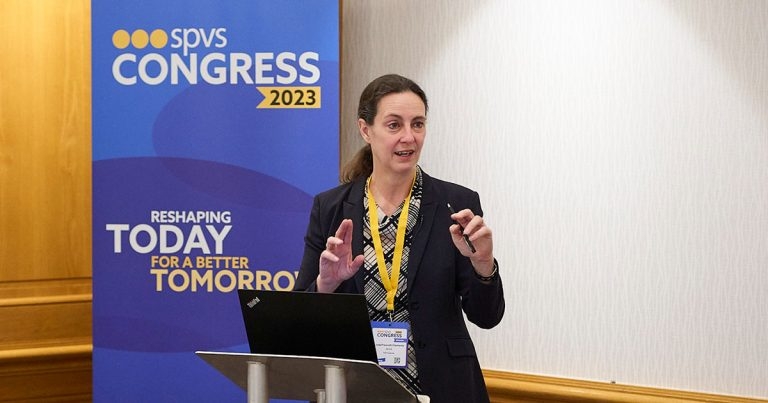7 Feb 2023
RCVS director of education warns of need for reform while college outlines work taking place to support changes it plans to implement from autumn 2024.

RCVS director of education Linda Prescott-Clements addressing delegates at SPVS Congress 2023.
The EMS system must be reformed if it is to be sustainable for future veterinary students, a senior RCVS official has warned.
The claim was made as the college outlined the work taking place to support the changes it plans to implement from the autumn of 2024 during a session at SPVS Congress, which took place on 26 to 28 January in Birmingham.
Delegates were also encouraged to get their own practices involved in the development of a project database of placement sites, which is due to be piloted later this year.
But RCVS director of education, Linda Prescott-Clements, argued that a “perfect storm” of growing demand, with three new vet schools due to begin teaching in the near futures, and recovering capacity after COVID-19, now makes change essential.
Dr Prescott-Clements said: “Increased student numbers are a good thing. We need more vets, but it does put more pressure on this system.
“We do need to do something to make it sustainable for the future.”
Under the college’s proposals, students would be required to complete 10 weeks of animal handling EMS, reduced from the current standard of 12, plus 20 weeks of clinical work instead of the present 26.
Individual species requirements are also set to be scrapped in a move officials believe will eliminate an element of “box-ticking” in current placements.
But while it acknowledged that views were divided between different stakeholder groups, the college argues a reduction in quantity can improve the quality of placements.
Dr Prescott-Clements told the session that, while most recent graduates and many providers favoured no change in the number of EMS weeks, current students wanted a reduction, while vet schools were concerned about the level of resourcing for the system.
She added: “We’re trying to balance our different perspectives of what the priorities are.”
Much of the discussion surrounding the new system focused on the database of providers, which the college intends to develop to enable both the booking of placements and improved communication between students and providers.
The session was told that work to develop the database is ongoing ahead of the pilot, which is expected to start this autumn.
But delegates warned that engagement needed to be a two-way process, as concerns were expressed that the system could become “a Tripadvisor for veterinary practices”.
Dr Prescott-Clements stressed, however, that feedback would still be collected by individual vet schools, and students would not be obliged to use the system to arrange their placements.
She added: “If students find a placement local to them that isn’t on our database ,they can still go there, but we’re hoping providers will want to be part of the database.”
The session heard the database will use a traffic light system, indicating a practice’s availability on individual dates; although, it would also emphasise that students should still contact providers they are interested in going to, even if they are shown as red.
SPVS board chairperson Peter Orpin also revealed that, while some practices were being “hammered” by placement demand, 60% of responses to its survey said they had seen four or fewer EMS students a year.
He said: “There are a lot that are not on the radar.”
Each participating practice will have its own page where it can set out details of its offer, including typical hours, the type of cases students should expect to see, available dates, transport links, accommodation provision and other potential benefits.
Dr Prescott-Clements insisted the database was also being developed to make it as straightforward as possible for practices to join, adding: “If it’s difficult, we’re not going to get providers.”
She also appealed both for practices to join the pilot programme and providers of animal handling EMS to sign up.
Any practices that are interested in taking part are asked to email [email protected] for further details.